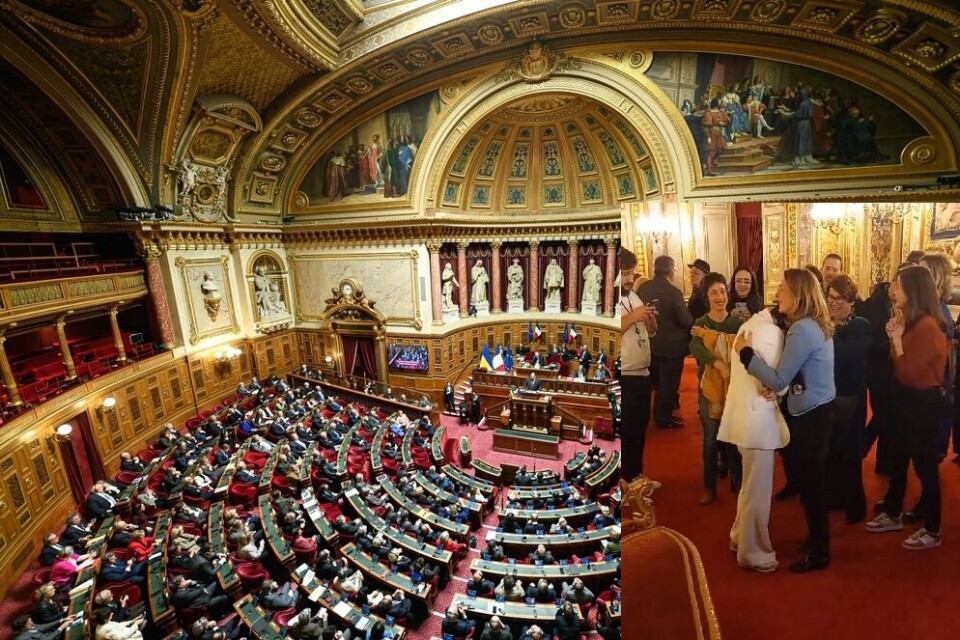-
Many Société Générale customers to be charged additional fees from April
There is some good news for international banking and instant transfers, however
-
Why gas prices in France are rising in April - and by how much
It comes after six consecutive monthly rises. Try these tips to reduce your bills
-
New notaire data suggests easing of Paris property crisis
Property experts have talked of ‘easing pressure’ and ‘breathing space’ after a four-year slump
SEE: Tears as senators back making abortion a constitutional freedom
France is on its way to being first country in world to enshrine abortion access in its constitution

Emotional images were broadcasted last night (February 28) as the French Senate voted in favour of making abortion a constitutional freedom.
Senator Mélanie Vogel, a member of the Green Party, was in tears after the vote, saying the Senate was “far from favourable” when the proposals were initially introduced in 2022.
“This is a historic, feminist victory,” she said.
“It will be a victory for women across the world,” added Communist Party senator Ian Brossat, who also voted in favour of the change.
Feminists and other supporters of the bill greeted senators with tears after the vote passed, with 267 in favour and 50 against.
“It was hard not to let your joy explode," said Floriane Volt of the Fondation des Femmes association.
Social media posts below show footage of senators and supporters alike after the vote.
A congress will meet in Versailles on March 4 to agree on the changes to Article 34 of the French Constitution.
Three-fifths of attendees of the congress (made up of members of both political chambers) must vote in favour of the changes, but this is overwhelmingly likely to happen, now both the Senate and National Assembly have voted in favour.
It will make France the first country in the world where access to an abortion is constitutionally guaranteed.
Read more: Simone Veil: a force for good, for women, for France, for all
Difficult path to success
France’s lower political chamber, the National Assembly, already voted in favour of the changes in 2022, however the Senate rejected the proposals, mostly due to the wording.
Right-wing members of the Senate (which is populated with more conservative members than the National Assembly) said they were generally in favour of the idea, but disagreed with the wording of the bill, in particular the ‘right’ to an abortion.
The updated motion replaced the word ‘right’ with ‘guaranteed freedom’ (liberté garantie), and earlier this year the National Assembly again voted in favour.
A 'right' has to be not only protected from interference, but provided with institutional support by the state (for example, the 'right to education' complies the government to provide free education for all and run a state schooling system).
This will be the first time the phrase 'guaranteed freedom' is included in the constitution, and it is not known exactly how it will work until the constitution is changed definitively by the congress.
The two main readings of this phrase are 1) access to an abortion can never be restricted, and the state can be penalised for hindering access to an abortion, and 2) the state must provide a 'guarantee' that this freedom can be accessed by all in France, which may include settign up some structural support.
Some were concerned that despite these changes, the Senate would again reject the motion, however their fears were allayed, with a strong showing in favour of the changes.
Read more: Why Macron wants the right to abortion added to French constitution
What are the current abortion rules in France?
Abortion was first decriminalised in 1975 in France, and since 2022, women have been able to get access to an abortion for the first 14 weeks of a pregnancy for elective abortions, and medical abortions – usually with a pill – in the first nine weeks.
Abortion costs are 100% refunded by social security, and there is no minimum age limit. You can read more about abortion rights (in English) here.
This timeline is not being impacted by the changes to the constitution.
By adding access to abortion to the French constitution, future governments will not be able to fully restrict abortion access in the country.
Efforts to constitutionally enshrine abortion in France gained traction after the overturning of Roe vs Wade in the United States, a landmark court case that provided the right to abortion in the US, although it was never constitutionally guaranteed.
A few countries in Europe do ban abortion, including Malta, Andorra, and Liechtenstein. In other countries, including Poland, it is only permitted in cases of rape, or when there is a threat to the life of the mother.
Related articles
International Women’s Day: Snapchat’s homage to France’s female icons
‘The main reason to live in France’: Your views on French secularism
























